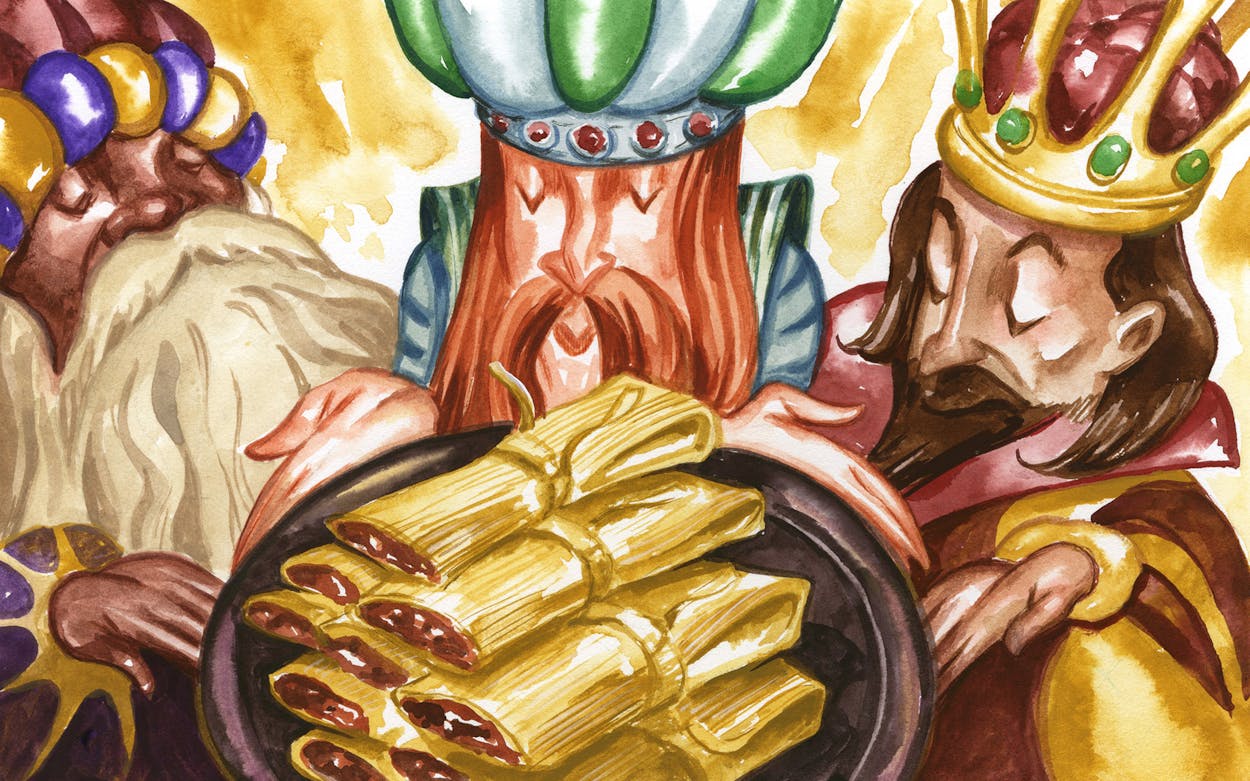Q: I’ve lived in Texas my whole life. All forty-three years, right here in the Lone Star State. Except for the first couple of years, when I didn’t know better, I have been a lover of all Tex-Mex foods. Strangely, until this year I never knew that tamales had some sort of Christmas connection. What exactly is the deal with Christmas and tamales?
Charley Hodge, Dallas
A: Among all the world’s gastronomic traditions, is there one that is more delectable than that of Mexico? The Texanist, an admittedly rabid devotee of most all foodstuffs originating south of the border, is certain that there is not. One of the stars of the Mexican kitchen—as well as the Tex-Mex kitchen—is the tamale, a delicious treat made with masa and a filling of the tamalera’s (tamale maker) choosing. There’s beef, chicken, bean, bean and cheese, squash, sweet corn, and on and on and on. The tamale options are infinite. The Texanist’s favorite is the classic pork variety. Glistening and slippery, they are the quintessential tamale and the Texanist is known to devour fistfuls of the slick little devils throughout the year. Mmm-mmm! Washed down with a Big Red or some cold Mexican suds, there’s nothing like it.
The debt of gratitude for the invention of the tamale is owed to the great Mesoamerican cultures of millennia past. The Aztec, Maya, Mixtec, Olmec, Toltec, and the Zapotec all took nourishment from the small banana leaf or corn husk-wrapped packets of goodness and each passed down their tamale customs through the generations. Interestingly, though, and to the point of your query, none of these ancient cultures were known to have celebrated Christmas. Indeed, some of them predated the birth of Christianity and none of them had even heard of Christmas before the Europeans arrived in the early sixteenth century. These peoples did observe their own traditions and celebrations—some of which involved sacrificial offerings (sometimes human) to their deities. There’s a theory that has such gruesome gifts being replaced, at some point, with a much more civilized option—tamales. The likes of Xochipilli, Tonacatecuhtli, and Ah Kinchil must have been very grateful for the change. The Texanist knows he certainly would have been were he an ancient god.
The thinking is that over time tamales became associated with special occasions and as the Mexican population was eventually Christianized, the tradition was transferred to the most important holiday on the Christian calendar. Which is why, come the holiday season, it is common for Mexican, Mexican-Texan, and Mexican-American families and friends to gather in kitchens big and small for annual tamaladas, or tamale making parties (read here about the Ruiz family’s 45-year tamalada tradition). The fruits of such gatherings, the dozens upon dozens of delicious tamales, are then divvied up and dispersed to friends, coworkers, and loved ones far and wide. Christmastime in Texas means it’s also tamale time in Texas. Can the Texanist get a great big hallelujah?
Still, as interesting as this history is, the important thing, the thing that really matters, the thing to appreciate is not how this tradition came about as much as that the tradition came about. Is the Texanist right?
Feliz Navidad and may god (and all the tamaleras) bless us, everyone, with lots of tamales.
Have a question for the Texanist? He’s always available at texanist@texasmonthly.com. Write to him there and be sure to tell him where you’re from.








